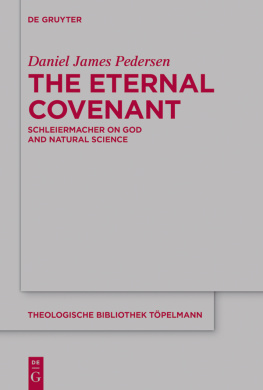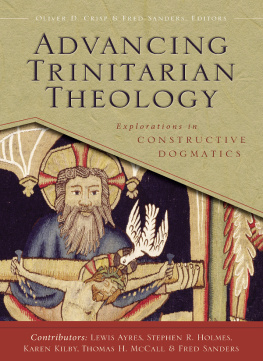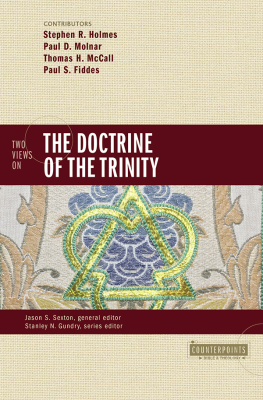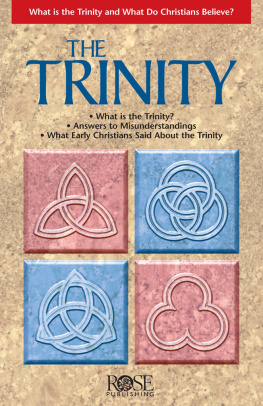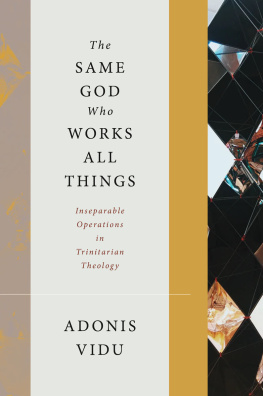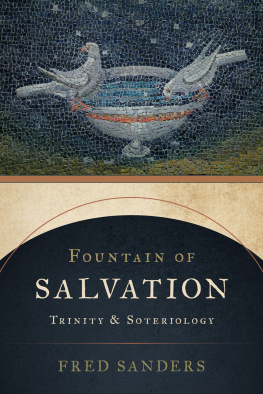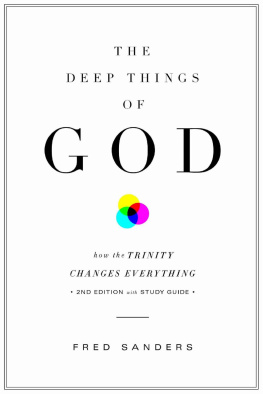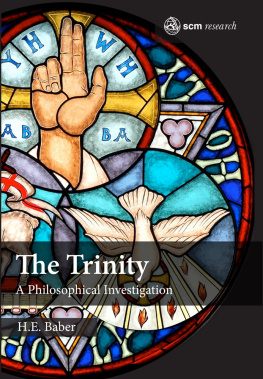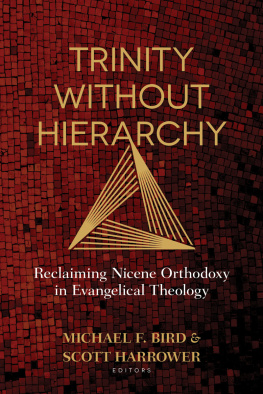ESSENTIAL TRINITARIANISM
To my parents, Karissa Celeste (Gambrel) Poe and Bobby Gene Poe Jr., for their lifelong love and encouragement
T&T Clark Explorations in Reformed Theology
Paul T. Nimmo and Paul Dafydd Jones
ESSENTIAL TRINITARIANISM: SCHLEIERMACHER AS TRINITARIAN THEOLOGIAN
Shelli M. Poe
Bloomsbury T&T Clark
An imprint of Bloomsbury Publishing Plc

CONTENTS
Chapter 1
INTRODUCTION
Chapter 2
SCHLEIERMACHERS APPROACH
Chapter 3
REJECTING IMMANENT TRINITARIANISM
Chapter 4
CONSTRUCTING ESSENTIAL TRINITARIANISM
Chapter 5
DEVELOPING ECONOMIC TRINITARIANISM
Chapter 6
DIVINE ALTERITY
Chapter 7
CONSCIOUSNESS OF GOD
Chapter 8
CONCLUSION
I would like to thank Paul T. Nimmo and Paul Dafydd Jones for their skillful editorial work in bringing this manuscript to publication. Working with Paul Nimmo to sharpen and refine the manuscript has been a great gift. Double thanks are due to Paul Jones, who served as my dissertation director at the University of Virginia, where much of the groundwork for this book was undertaken. His careful feedback and gracious mentorship during my doctoral studies and beyond have been invaluable.
Conversations with Margaret E. Mohrmann, Kevin J. Hart, and Trenton Merricks, who served on my dissertation committee, have also remained with me through the years. In addition, my colleagues in the Schleiermacher Unit at the American Academy of Religion have been wonderfully beneficial interlocutors along the way, especially Terrence N. Tice and Catherine L. Kelsey. Those involved in Millsaps Colleges Works in Progress faculty cohort also deserve special thanks for entertaining my unfinished thoughts: Steven G. Smith, Elise L. Smith, Anne C. MacMaster, and Elizabeth E. Egan. Thanks, as well, to my summer 2015 undergraduate assistant Katie Lane Kirkland, who assisted in the preparation of a draft of the manuscript and from whom I expect great things.
I also want to express my deep gratitude to those who have supported me during the process apart from direct influence on the book. Emily O. Gravett, Karen V. Guth, and I walked together through our doctoral work. Their friendships over the years have provided sustenance I scarcely could have done without. My beloved stepchildren, Henry and Maggie, have revived my spirit over and again with their silliness and tender hearts. Finally, I want to thank my spouse and partner, Jody Benjamin Walker, for his daily love and support. The moments we share create an undercurrent of joy in my life that provides renewal each day.
Shelli Marie Poe
Jackson, Mississippi
May 2017
Works of Friedrich Schleiermacher
CF: H. R. Mackintosh and J. S. Stewart, eds., The Christian Faith (New York: T&T Clark, 1999).
CG: Martin Redeker, ed., Der christliche Glaube nach den Grundstzen der evangelischen Kirche im Zusammenhang dargestellt (18301831), (Berlin/New York: Walter de Gruyter, 1999).
OD I: Moses Stuart, trans., On the Discrepancy between the Sabellian and Athanasian Method of Representing the Doctrine of a Trinity in the Godhead (Part One), Biblical Repository and Quarterly Observer 5, no. 18 (April 1835): 265353.
OD II: Moses Stuart, trans., On the Discrepancy between the Sabellian and Athanasian Method of Representing the Doctrine of a Trinity in the Godhead (Part Two), Biblical Repository and Quarterly Observer 6, no. 19 (July 1835): 1116.
OG: James Duke and Francis Fiorenza, trans., On the Glaubenslehre (Atlanta: Scholars, 1981).
OR: Richard Crouter, trans., ed., On Religion: Speeches to Its Cultured Despisers (Cambridge: Cambridge University Press, 1996).
BO: William Farrer, trans., Brief Outline of the Study of Theology (Eugene, OR: Wipf & Stock, 1850).
DE: Iain G. Nicol and Allen G. Jorgenson, trans., On the Doctrine of Election, with Special Reference to the Aphorisms of Dr. Bretschneider (Louisville, KY: Westminster John Knox, 2012).
This book sets out the view that Friedrich Schleiermacher is an authentically and creatively Trinitarian thinker in his magnum opus, Der christliche Glaube (183031), which is translated as The Christian Faith and referred to as the Glaubenslehre. Speaking to his authenticity as a Trinitarian thinker, Schleiermacher forms his entire theological system in accordance with the indwelling of God in Christ and the activity of his Spirit after the Redeemer is no longer present on earth. These are the basic Christian facts that a doctrine of the Trinity seeks to bring into line with Christian monotheism. Accordingly, the theology of the Glaubenslehre revolves around Christ while bearing a Trinitarian shape: Gods preparation in creating and governing the world before the incarnation, the incarnate life of God in the person of Jesus of Nazareth, and the continuing union of the divine essence with humanity in and through the Spirit of Christ in the Church.
To highlight the extent to which Schleiermachers theology is shaped by attention to Christ, I employ the word Christomorphic.Christ and his Spirit in the Church, it highlights Gods threefold economy of salvation.
Speaking to Schleiermachers creativity as a Trinitarian thinker, his work exhibits a way of thinking about God that is textured by three basic expressions of the divine essence: divine causality, love, and wisdom. These are not merely divine attributes, on equal dogmatic footing with other attributes like divine justice, holiness, or eternity. While such attributes are legitimate and instructive ways of describing God, for Schleiermacher they do not express the very essence of the divine. A Christian understanding of the very essence of God is, for Schleiermacher, directly related to the reception of redemption by God in Christ and the Spirit. As such, God is essentially love. Moreover, the purposes and plans of divine love are outlined by divine wisdom. And the actualization of divine wisdom occurs in and through divine causality or activity. These three coinhering expressions of the one divine essence are derived from and therefore presuppose the divine economy of salvation. In this way, Schleiermachers Glaubenslehre can be read as offering a careful and creative understanding of God and Gods relation to the world, which attends to both the threefold economy of salvation and the triune divine essence.
Setting out this view of Schleiermachers Glaubenslehre is important, because scholars would generally dispute the claim that he is an authentically and creatively Trinitarian thinker. He is often viewed, instead, as an overly subjective theologian or one who might be accused of sexism because of his privatization of Christianity or as a liberal thinker situated within his Enlightenment and Romantic contexts. In the first section of this chapter, I briefly take account of the viewpoints of Schleiermachers critics to situate the import of the thesis that this book advances and to clear a way for a fresh interpretation of Schleiermacher. In the second section, I introduce the meaning of essential Trinitarianism as I am using the phrase. I then introduce the backward-moving method of interpretation by which Schleiermachers Glaubenslehre might be read in order to arrive at a view of his theology as essentially Trinitarian. I also highlight some important benefits of proceeding in this way in the interpretation of Schleiermachers theology. In the third and final part of this chapter, I proceed to offer a detailed overview of the argument that unfolds in the chapters to follow.


